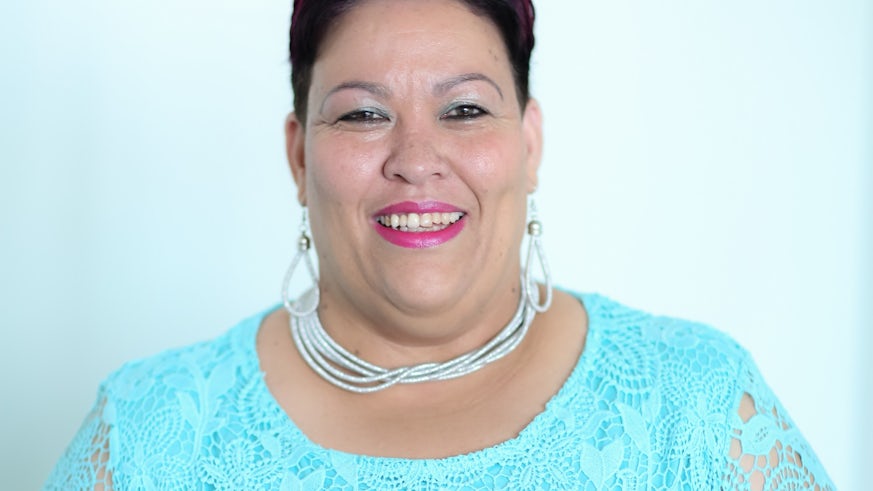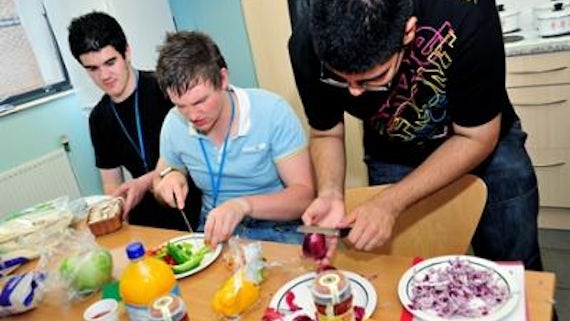Mission to make learning accessible
15 November 2017

Dr Maggy Beukes-Amiss from the University of Namibia (UNAM) is on a mission to make learning as accessible as possible.
Much of her career has been spent breaking down barriers by using technology to its full potential. She is enthusiastic as she explains the potential impact of plans for an ambitious and unique joint eLearning hub with Cardiff University.
The eLearning joint platform proposal is part of the Phoenix Project, a partnership between Cardiff and UNAM to tackle poverty, promote good health and support education in Namibia. With great potential as an educational Africa-Europe university partnership, it would benefit staff, students and the general public by providing a wealth of learning and practical training resources.
Dr Beukes-Amiss, Director of the Centre for Open, Distance and eLearning (CODeL) at UNAM, said the platform would enhance the already significant impact of the “absolutely fantastic” Phoenix Project.
“The Phoenix Project has made a huge impactful difference in my opinion from so many angles,” she said.
“Nurses are trained in midwifery and have gained new skills, police officers are trained to use the newly designed Trauma Packs developed under the flagship of the Phoenix Project, young people have attended the UniCamp, there's the multilingualism project, the infrastructure hub sub-projects, to mention a few, all of which are so impactful.
“It’s of tremendous benefit for the country now and in the future.”
There is currently no central point to share the resources created for this transformative work but that is set to change with plans for the new e-platform.
The new hub is likely to feature video, audio, online courses, educational tools, presentations and CPD courses through a phased implementation approach that has been pulled together for the Phoenix Project’s work so far. This will include training and development in areas such as anaesthesia, mathematics, first responder skills, nursing, software programming, study skills, confidence and team building for young people, and much else besides.
It will have internal aspects accessible to Cardiff University and UNAM staff and students as well as external aspects that could potentially be used by anyone.
Dr Beukes-Amiss, who has just spent a week formulating plans with colleagues at Cardiff University, said: “I’ve had an extraordinary five days – it was packed to capacity but I can’t begin to tell you how great it was.
“In every single meeting I’ve learnt a different way of using technology, even the ones that I am already familiar with, always on the look-out of what I can bring back for the benefit of the entire CODeL team.
“We want to create a common space where all of these impactful projects can be showcased. Resources, videos, whatever went into it, will be hosted on this platform.
“For the external part we’re thinking of CPD courses, like digital capability courses for example – resources can be there for any citizen and people will be able to upskill themselves. It will be a rich resource of content and material.”
The Phoenix Project is part of Cardiff University’s Transforming Communities initiative to boost health, wealth and wellbeing in communities around Wales and further afield. Launched in 2014, it is already making a huge impact in Namibia where it has been praised by everyone from Government Ministers to Higher Education leaders.
The new eLearning platform would allow its work to benefit more people, potentially around the world.
“We’re in a generation of lifelong learning. People will always want to learn and develop,” said Dr Beukes-Amiss, whose PhD is in Computer-integrated Education (CiE).
“People won’t have time for learning unless they can do it flexibly through eLearning, where it will be most applicable to have full-fledged online courses, but mostly following a blended approach. This will be of benefit to everybody once visible.
“The benefits are endless whether it’s staff and students in Namibia, in Cardiff, or the general public.”
Dr Beukes-Amiss and her team may still have a lot of work ahead on their professional mission to make education more accessible, but this would undoubtedly be a significant step.
Share this story
Read more about our transforming communities projects that show our commitment to improving the wellbeing of communities in Wales and beyond.



